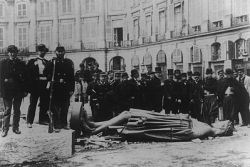Halifax Media Co-op
News from Nova Scotia's Grassroots
Why the term "left-wing" still matters
By Kyle Buott
People say Left and Right are no longer relevant terms in the new millennium. They say we have moved beyond such simple identifications.
This is a right-wing argument that tries to disorient and trick people. Left and Right are terms just as meaningful today as when they were created.
Using the term "left-wing" to refer to people who are politically progressive and the term "right-wing" to refer to people who are politically conservative comes from the French Revolution in 1792. Those who thought the revolution's goals of democracy and ‘Liberty, Equality, Fraternity’ were being betrayed sat on the left side of the room, and those who wanted to restore the old regime sat on the right side.
Yet the concept goes back much further.
When I say that I am on the Left, or that I am a leftist, I am identifying with a political tradition dating back as far as the Roman Empire, maybe further. I am identifying with the good, the bad, and the ugly. The major successes and the major defeats.
By calling myself a leftist I put myself on the side of slaves who rose up against the Roman Empire. On the side of peasants who rebelled against the Catholic Church and Aristocracy. On the side of all workers organizing collectively and striking for their rights. On the side of all revolutionaries everywhere struggling for justice, compassion and equality. On the side of the oppressed against the oppressor.
This is a history that dates back well over 2,000 years. It is the history of the class struggle. The history of the dreams and struggles of the working classes for a better world and the often violent repression used by the ruling class to crush those dreams.
JB MacLachlan, a socialist and trade union leader from Glace Bay, said it best:
“I believe in education for action. I believe in telling children the truth about the history of the world, that it does not consist of the history of kings, or lords or cabinets. It consists of the history of the mass of the workers, a thing that is not taught in the schools. I believe in telling children how to measure value, a thing that is not taught in any school.”
The ruling class tries to erase our history. In schools they teach of kings and queens and 'great men' while ignoring the history of the majority of us. We forget this history at our peril. “No root. No fruit.”
As radicals and progressives, when we remember our history, we are the Left.
Kyle Buott is the president of the Halifax and Dartmouth District Labour Council and a member of Solidarity Halifax.
Commentaires
Well, that's a bit of historical revisionism.
If you want to trace the origin of the contemporary left to the French Revolution, fine, though, given, I find the proposition problematic. But to Sparticus? To "[. . .] [A]ll revolutionaries everywhere struggling for justice, compassion and equality [. . .] [T]he oppressed against the oppressor."? Doesn't this implicitly have colonial implications, insofar as it writes European political narratives on to a whole lot of oppressed people who may not only not concieve of themselves as "leftist" but who have historically come in to conflict with "the left"?
Shouldn't "identifying with the good, the bad, and the ugly" mean recognizing that, historically, the self-described left has not always been on the side of the oppressed against the oppressor, but quite the opposite?
If the contemporary left is going to be any different, it needs to grapple with its particular historical character, and not an idealist conception of itself. F'real.
The site for the Halifax local of The Media Co-op has been archived and will no longer be updated. Please visit the main Media Co-op website to learn more about the organization.



